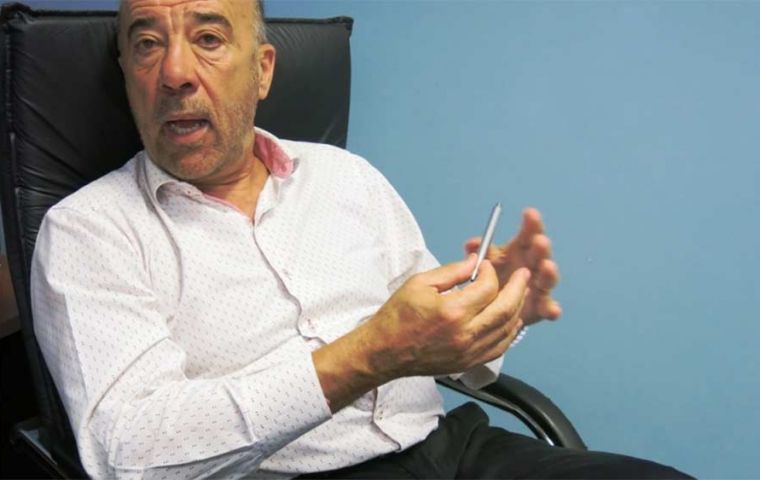MercoPress. South Atlantic News Agency
Venezuela closer to Mercosur and Argentina
 Ambassador Oscar Laborde has already organized several trade missions to Caracas
Ambassador Oscar Laborde has already organized several trade missions to Caracas Venezuela's return to Mercosur, the resumption of flights between Buenos Aires and Caracas, and an invitation to President Nicolás Maduro to attend the CELAC summit in Buenos Aires next month are some of the signs showing the Argentine government's rapprochement with Chavismo. In addition to that, a rise in bilateral trade of up to 60% is expected.
Maduro is expected to attend the summit because by then Brazil will be represented by Luiz Inácio Lula Da Silva, who is said to favor Venezuela's return to the bloc from which it was suspended in 2016 for failing to abide by the group's democratic standards. L
ula has already announced the resumption of diplomatic ties with Venezuela, interrupted by the administration of the outgoing Jair Bolsonaro. And since 2015 under then-President Mauricio Macri, Argentina lowered its diplomatic ties with Caracas to a chargé d'affaires until Oscar Laborde was again appointed this year as the country's ambassador.
Also on the guests' list for the Summit are Cuba's Miguel Díaz Canel and Nicaragua's Daniel Ortega.
However, Maduro has close ties with Vice President Cristina Fernández de Kirchner who in some ways is an opponent to President Alberto Fernández's hopes for reelection. Maduro has been critical of Alberto Fernández for the seizure of the Emtrasur freighter aircraft and even called him a “puppet” of the [US] empire.
Aerolineas Argentinas stopped serving Caracas in August 2017 and the Venezuelan state-owned Conviasa resumed flights in early 2022 but lifted the route after the Emtrasur scandal a few months later. Privately-owned carriers of both countries are expected to resume air connectivity shortly.
After trade between the two countries became almost non-existent following the so-called “parallel embassy” scandal involving the Ministry of Planning, the revived Venezuelan-Argentine Chamber of Commerce (Cavernarg) estimates that this year exchanges will amount to around US$ 300 million.
“In the new turn in political and economic relations that is taking place between Venezuela and Argentina, the private sector will play a central role,” said Laborde, who is now seeking to focus on an economic agenda with a regime that has also embarked on a dialogue with the United States, another with Europe, and other economic reforms.
Laborde has already organized several trade missions to Caracas with the participation of companies such as Rizobacter, Tedeschi, Chemtec, Hersems, and Bernardín, involved in investment projects with Argentine capital and in strategic alliance with Venezuelan private companies for the development of agricultural production, with the transfer of knowledge, state-of-the-art technology inputs and updating of the production machinery from Argentina.
The second edition was attended by the companies Biogénesis Bagó, La Lechera Santa Clara, and the pork producer ISOWEAN S.A., and focused on the development of pork production in Venezuela. In order to start a large-scale pork industry, inputs and vaccines will be required, which would be exported from Argentina within the framework of a technology transfer program that would culminate with the change of Venezuela's status to a country free of foot-and-mouth disease with vaccination.
Then there is another program known as “Venezuela and Argentina Hermanadas por la Producción” (“Venezuela and Argentina Twinning for Production”), through which a delegation of Venezuelan companies traveled, led by the Venezuelan-Argentine Chamber of Commerce, presided by businessman Benjamin Tripier, focused on the food, medicine, laboratories, technology, coffee, financial markets, and stock exchange, among others. (Source: Clarín)




Top Comments
Disclaimer & comment rulesCommenting for this story is now closed.
If you have a Facebook account, become a fan and comment on our Facebook Page!